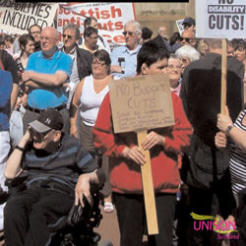Glasgow City Council has stopped short of ordering a full review of the personalisation process – the new funding model that gives disabled people their own budget to spend on services – despite complaints from campaigners that it has resulted in cuts to services of up to 70 per cent.
After a meeting of the Council last week, the union Unison announced that councillors had ordered a "full and open review" of the policy and hailed this as a "real step forward".
However, the Council has since said this is not correct. Instead, it has opened up membership of an existing advisory forum, to service users and their carers. It has, however, also admitted there is "some concern" about the policy.
Background
Also referred to as direct payments or individual budgets, personalisation is a relatively new model for social care delivery whereby service users are assessed as to their needs and assigned an individual budget with which they can choose the services they wish to buy.
It was trumpeted by local authorities as giving more control to the service user and their carers to choose the help and support that they want, rather than the old top-down, one-size-fits-all model of provision.
In April 2010, writing on civilsociety.co.uk about the impact of personalisation on charity finance departments, the finance director of learning disability charity Dimensions described it as “arguably the biggest change social care has ever seen”.
Inadequate funding
But evidence is now emerging that personalisation hasn’t been the success it was hoped to be. A group of campaigners led by the union Unison has claimed that hundreds of vulnerable people throughout the city of Glasgow have “had their lives turned upside down by personalisation”, because it has been introduced without adequate funding.
On Saturday 10 March, Unison hosted a half-day community conference on personalisation in Glasgow that posed the question: ‘Is personalisation just a cover for cuts?’ Three weeks later, Green Councillor Danny Alderslowe lodged a motion calling for the process to be halted so that a full and open review could take place.
But this was rejected by the full Council, who claimed that "a significant majority" welcomed the personalisation process.
Sharing support
Cheryl McCormick, a care worker and Unison steward, said: “Those who have been through the personalisation process thus far have lost much of the support they used to receive. They are now having to share their support with others – not out of choice but because otherwise they wouldn’t have any support for the hours that they need it.”
In one example, she said, day centres no longer had enough staff to take service users out during the day, “so they are left indoors all day either watching TV or drawing pictures”.
Concept could be undermined
Mandy McDowell, Unison regional organiser, said of the Council's decision: "This result isn't as much as we would have wanted and I understand it is now less than a review. We welcome the acknowledgements and the debate that took place but clearly we have more work to do."
She added: "There is lots of concern and anger about the effects on people. If we let the Glasgow model go forward unchallenged it will set a precedent to other authorities and this will undermine the whole concept of personalisation. It doesn’t have to be like this – it can and should have adequate funding and safeguards for staff.”
Unison says it still supports personalisation as a concept, provided it is implemented properly. The union is demanding a better assessment process for those with complex needs; better engagement with service users and their families; a living wage for all support staff; and support for all service users so that they can make the most of the process.
Unison has produced a bulletin on the subject. Personalisation - the facts can be downloaded here.









